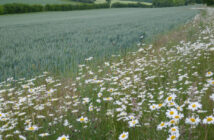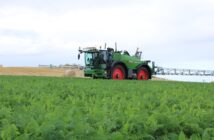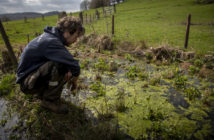New research that could increase the natural resistance of wheat to a devastating fungal disease has begun at Heriot-Watt University in Edinburgh.
Heriot-Watt is a global research-led university based in the UK, specialists in business, engineering, design, environmental and life sciences.
Wheat is the world’s second biggest grain crop by volume – with around 800 million metric tons produced last year. With the global population set to reach 10 billion people by 2050, increasing the size of wheat crops is becoming increasingly urgent
But wheat faces a growing threat from septoria tritici, which can destroy up to 20% of wheat crops a year.
“Countries in Northern Europe are vulnerable to septoria because of the weather,” explained Dr Angela Feechan, a plant pathologist – an expert in plant diseases – at Heriot-Watt’s Institute for Life and Earth Sciences. “We have more rain – and the fungus is a big fan of rainy, humid conditions.”
“We can’t completely control it with fungicides – chemicals used to control fungal crop diseases,” Dr Feechan added. “So, we need to think of different ways to try and control it. And one of the ways you can do that is through genetics.”
The research will examine why some wheat varieties are more resistant than others to this disease.
Dr Feechan and her team will examine specific genes in different wheat varieties, and how the products of these interact with the fungus that causes septoria. This fungus is called Zymoseptoria tritici (Z. tritici) and attacks the wheat plant through spores.
These destroy the plant’s ability to absorb sunlight through photosynthesis – turning the leaves of the wheat plant yellow and speckled, killing areas of the leaf.
“We think there are very small differences in the genes of different wheat varieties that determine whether or not they are resistant to this disease,” Dr Feechan said. “If we can find the difference in these genes that give us resistance, they could be used to breed resistant wheat varieties in the field.”
The Heriot-Watt researchers will be working with a collection of 300 wheat varieties at INRAE, France’s National Research Institute for Agriculture, Food and Environment, as part of a collaboration.
The research is funded through a postdoctoral fellowship from UK Research and Innovation – the UK’s national funding agency for investing in science and research. Developing the natural resistance of wheat through the plant’s existing genetic diversity is distinct from genetic modification, which involves altering a plant’s genetic makeup, Dr Feechan added.




